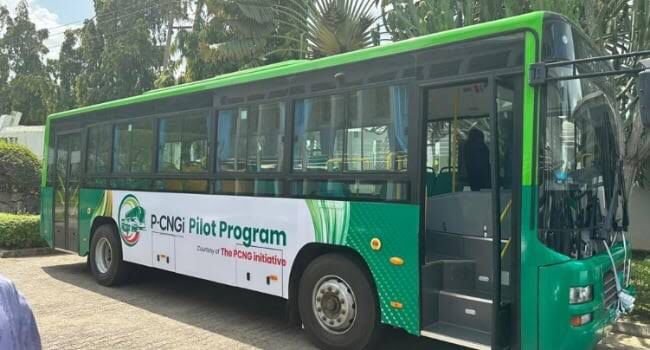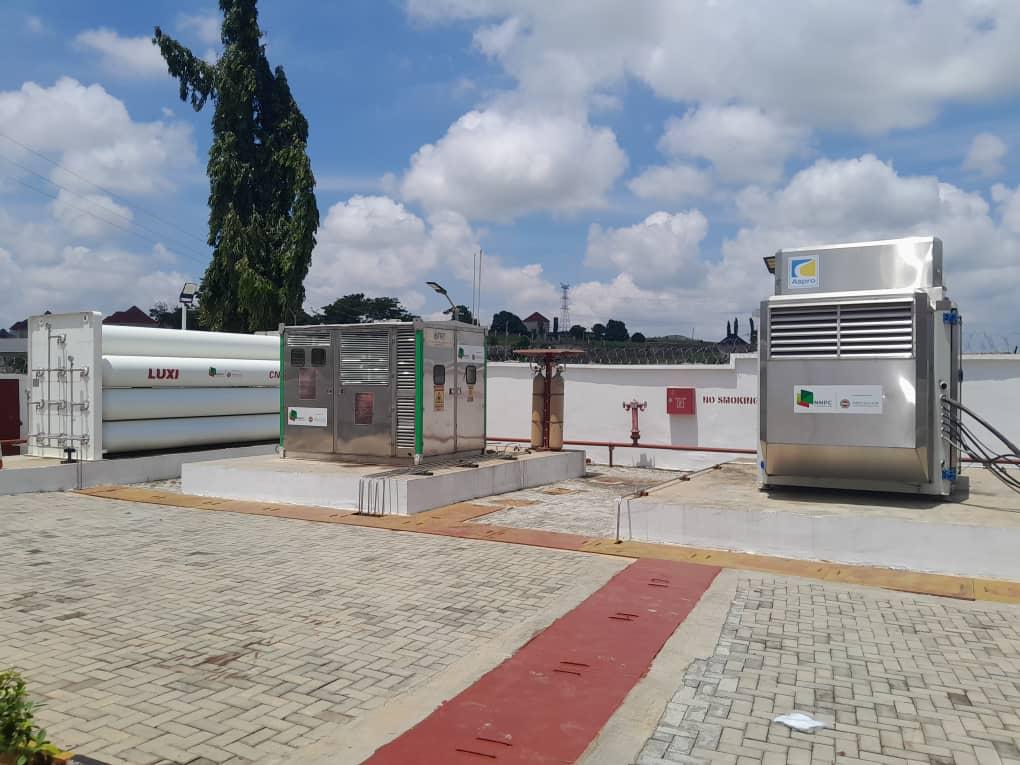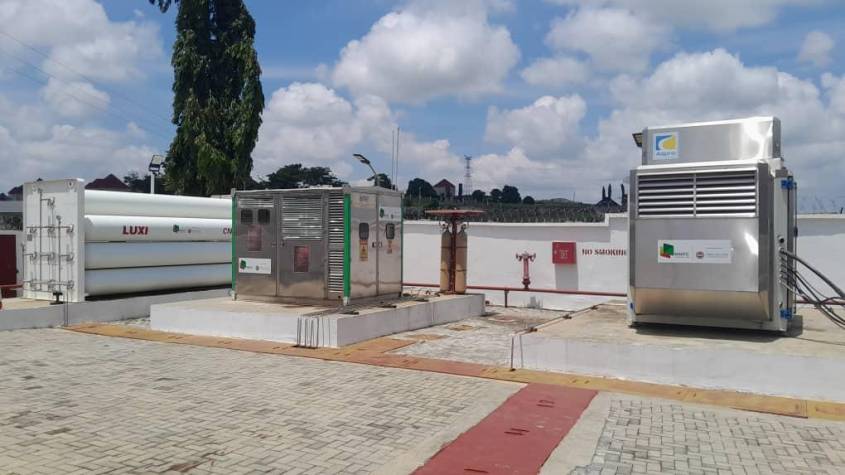SOJO | How Nigeria’s CNG Initiative is Reducing Vehicular Emissions
Beyond being cost-effective and environmentally-friendly, Nigeria’s current transition to Compressed Natural Gas (CNG) could improve public health of millions of urban dwellers while advancing Nigeria’s sustainable urban development agenda in alignment with the Sustainable Development Goals (SDGs).

For 32-year-old Abuja Bolt driver Obiora Alfred, switching from petrol to Compressed Natural Gas (CNG) was an eye-opener. Within a week of conversion, he realized he had waited too long to switch. Despite the shortage of CNG at gas stations resulting in long queues, Alfred prefers the long queues – knowing that a ₦3,000 fill-up will give him greater profits than ₦20,000 petrol ever did.
“Before I converted my vehicle to a hybrid CNG-powered one, working full-time cost me ₦20,000 daily on fuel. Now, even though I work part-time due to the time I spend queuing for gas, I only spend ₦3,000 on CNG daily which fetches me ₦20,000 or even more. For me, CNG is simply better,” Alfred said.
Alfred admitted that shortly after converting his vehicle to a CNG-powered the engine made minor noises but his mechanic assured him it would stabilize. Beyond being cost-effective he appreciates CNG’s environmental sustainability. CNG is a relatively clean energy source compared to petrol with reduced emissions of harmful greenhouse gases such as carbon monoxide and nitrogen oxides, key contributors to global warming.
The total number of registered vehicles in Nigeria is estimated at 13.9 million. These vehicles are major contributors to the greenhouse gas emissions that pollute the air while prolonged inhalation of polluted air results in health complications particularly respiratory disorders such as asthma, chronic obstructive pulmonary disease, and lung cancer.
Recall in August 2023, Nigerian President Bola Ahmed Tinubu approved the establishment of the Presidential Compressed Natural Gas Initiative (PCNGI) to ease the impact of fuel subsidy removal on Nigerians by reducing energy costs. Sequel to the removal of the petrol subsidy in May 2023, petrol prices have increased significantly hence the introduction of CNG as an alternative to the now prohibitive costs of petrol.

CNG’s Environmental, Health Benefits
Emmanuel Kilaso, Executive Director of Secure Cycle Environmental and Climate Change Initiative says CNG produces significantly less carbon dioxide and virtually no particulate matter and sulfur dioxide hence is much cleaner than petrol and diesel. “If widely implemented CNG adoption could reduce Nigeria’s air pollution levels, improve public health outcomes, and contribute to the country’s long-term sustainability goals.”
Dr. Usman Bashir, a public health physician and environmental enthusiast at the Aminu Kano Teaching Hospital (AKTH) agrees. He underscores the health benefits of CNG compared to traditional fossil fuels. “From a healthcare perspective, CNG is undoubtedly safer than petrol because it produces fewer harmful gases that can impair respiratory functions and contribute to chronic health conditions.”
Beyond health advantages, Nigeria’s shift to CNG offers economic and environmental benefits. However, its success hinges on addressing key challenges inhibiting widespread adoption. Limited fueling stations have led to supply shortages and long queues and waiting periods at gas stations just as high conversion costs deter many vehicle owners from going for CNG.
In urban centers like Lagos, Abuja, and Kano where air pollution is severe, transitioning to CNG could be a game-changer for improving air quality and public health of inhabitants of the large metropolises with millions of people while advancing Nigeria’s sustainable urban development agenda in alignment with the Sustainable Development Goals (SDGs).

The Roadblocks to CNG Transition
Like Alfred, Ali Ibrahim has also converted his petrol-powered vehicle to a hybrid one that also uses CNG describing the shortage of CNG stations as a nightmare! Ibrahim says oftentimes he would drive long distances in search of CNG without success. “The queues are frustrating and time-wasting. This shortage of CNG stations discourages many Nigerians from adopting CNG despite its economic and environmental benefits.”
Yunusa Hamza shares the same frustrations. He said the long hours of waiting at the CNG stations means losing productive work hours adding that he recently spent a whole day waiting at a CNG station only to be notified by the station’s manager that the truck transporting the gas was not coming at the end of the day. “The government needs to provide additional stations to meet users’ demand,” he pleaded.
Another major barrier to CNG adoption is the cost of installation of CNG kits. The PCNGI has introduced a Conversion Incentive Program to either provide free or heavily discounted conversions to commercial or ride-share drivers in Nigeria. Yet, many drivers complained that their efforts to get their vehicles converted to CNG via the government-designated centers proved abortive.
While some vehicle owners, like Alfred, had their conversion process subsidized by their benefactors, most drivers said they paid no less than ₦500,000 with some spending up to ₦1,500,000 for the conversion process. For many Nigerians in this period of economic uncertainties and high cost of living, the high upfront cost for CNG conversion remains a major barrier to adopting CNG.
In July 2024, the Nigerian National Petroleum Company Limited (NNPCL) and NIPCO Gas Limited commissioned twelve CNG stations in Lagos and Abuja. The government promised to roll out CNG 100 stations across the federation including six CNG model stations across Nigeria by the end of 2025. Yet, 100 CNG centers are but a drop in the ocean in a country with around 14 million registered vehicles.
Despite the Nigerian government’s push to promote CNG, more needs to be done to ensure its availability and accessibility for all Nigerians. Our findings reveal even in major urban centers like Abuja and Lagos getting gas for drivers of CNG-powered vehicles is a herculean task. Just as awareness of the cost-effectiveness and environmental benefits of the novel initiative remains low among Nigerians. Experts believe the success of the CNG initiative depends on addressing key challenges militating against its adoption in Nigeria.
Scaling CNG Adoption for a Sustainable Future
Muhammad Usman, CEO of Attayseer Autogas Nigeria Limited believes the responsibility of ensuring large-scale CNG adoption lies with the government. “The government must invest in awareness building and expansion of CNG conversion centers, establish adequate fueling stations, and subsidize conversion costs. This will make CNG more accessible, and create job opportunities for Nigerian youth,” he said.
Kilaso echoed these sentiments urging for the expansion of conversion centers across the country including to underserved areas to improve access to CNG. “Financial incentives, such as subsidies, tax breaks, or low-interest loans, should be provided to investors to encourage CNG adoption. Investment in local production of CNG kits is necessary to reduce set-up costs and reliance on imports. Collaboration with the private sector would also accelerate the growth of the CNG ecosystem in Nigeria.”
Dr Bashir however cautions that one of the risks of using CNG in a vehicle is its inflammability as any leaks in the storage or fuel delivery system could lead to an explosion or fire outbreak urging regulatory agencies to enforce safety mechanisms. “Agencies like the Standard Organization of Nigeria (SON) must stay on alert about the kinds of cylinders conversion centers use and make sure they are of the right quality.”
While CNG adoption presents an opportunity to combat air pollution, improve public health outcomes and promote sustainability in Nigeria, its success depends on addressing existing bottlenecks such as set-up costs, accessibility, safety, and awareness for a greener future. If widely implemented, the CNG initiative will put Nigeria on the path to achieving SDG 11 (Sustainable Cities) and SDG 3 (Ensure Healthy Lives) among others.
No doubt government intervention through subsidies for CNG investment would greatly help Nigeria’s energy transition. Yet, without widespread awareness of CNG’s multiple benefits, adoption rates may still stagnate. Likewise, strengthening public-private partnerships will foster greater investment in CNG conversation centers and gas stations and ensure a smoother transition to clean energy in Nigeria.
With additional reports by Ismail Auwal and Benjamin Joseph. This solutions story was an outcome of a masterclass on climate solutions reporting for Nigerian journalists by African Newspage in October 2024. The story was supported by Nigeria Health Watch which leverages informed advocacy and communication to influence health policy and seek better access to healthcare in Nigeria.










